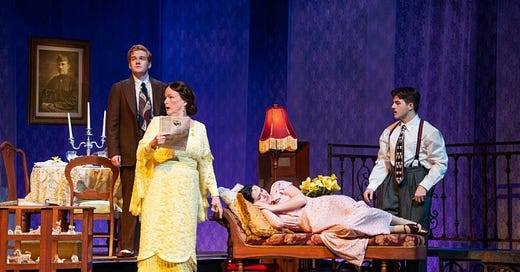Review: Charleston Stage dusts off a mesmerizing 'The Glass Menagerie'
Repost of Maura's review in The Charleston City Paper
The late, great Tennessee Williams’s so-dubbed memory play, The Glass Menagerie, requires as fine a hand to coax out its abiding luster in many ways as does its character Laura when ministering to her prized collection of fragile glass animal figurines.
Steeped as it is in recognizable Southern characters, like the matriarchal debutante and the booze-fueled wayward writer of a son, it could easily go off the rails with Foghorn Leghorn accents and low-hanging swipes at regional culture. But Williams took the lush, murky stuff of the South and rendered it universally devastating, both the familiar and the familial.
So it was with cautious optimism that I made my way to the Dock Street Theatre for Charleston Stage’s new production of the work, which is deftly directed by the company’s longstanding, now-retired founder Julian Wiles and runs through March 16.
I was greeted by scenic designer Adam Jehle’s impressive, if slightly cramped. set representing a none-too-impressive St. Louis apartment adjacent to a nearby blaring jazz club and appointed with all manner of outmoded brown furniture. The stage juts out between a fire escape and terrace that offer the only reprieve from the frequently stultifying air within.
It is home to the three members of the Wingfield family. Amanda is the gastro-intestinally-fixated, former Southern deb matriarch. Her son Tom is a would-be writer consigned to pay the rent by trudging each day to his mind-numbing job at a shoe factory. And then there is Laura, an achingly shy shut-in whose pleurosis-disfigured leg and social awkwardness all but felled any prospects of a future beyond her current trappings.

Ah, but then there is that dimly twinkly light just beyond the rusty fire escapes evocatively flanking the stage. That would be a gentleman caller, a fellow by the name of Jim O’Connor (Luke Shaw). The unwitting former high school athlete works with Tom at the factory, and Amanda is all out to transform a dinner invitation into the means to save Laura from her clear fate. That may well also resurrect the dashed hopes of Amanda, an abandoned wife clinging to her once, and, fingers-crossed, future station in life.
A couple of years back I might have pronounced that times have largely changed, and that the fate of Southern females is not in the hands of a random dinner guest whose chief attribute is his gender. But a glance at this week’s South Carolina headlines demonstrate, that in this state, a Southern woman’s fate still hangs dangerously in the balance of an Every Bro.
So it makes utter sense for Amanda to deploy her Southern wiles to wrangle a caller, carping on Tom and gussying up Laura to that end. As Amanda, Marybeth Clark, the company’s artistic director, delivers an exquisitely balanced dance between old-school debutant coquettishness and fanged venality, bemoaning the lessened circumstances of her brood while in the next breath lashing out at them, with the rubber-necking audience held masterfully in her matronly grasp, while doling out ample comedic touches, too.

As for the younger generation, they certainly read as far more fresh-faced nubile than I recall them in my young mind’s eye. As Tom, Sam Majors makes up in boyish, affecting charm what he may lack in the way of seasoned gravitas. As Laura, Abigail washes the stage in moon-faced, glistening innocence, as easily shattered as the glass menagerie on which she so clearly projects her yearning for a finer world. As Jim, Shaw unleashed a short burst of unchecked hope onto the Dock Street stage, the type that can break horns off of Laura’s glass unicorn, and shatter the magic of rare young women, too.
All in all, this absorbing, fine local revival of a seminal American classic is worth calling on. With its transfixing entrée into a sliver of yesteryear, it may today also elicit a shutter of times to come, revisiting an era when women are valued through the prism of their marital prospects, and men who would be poets are rendered irrelevant.
I’m thinking Tennessee Williams may well concur. That would be a modern-day tragedy.
Catch “The Glass Mengaerie” at Charleston Stage until March 16. Tickets start at $59.25 at charlestonstage.com.





Maybe it was TW inspiring the critic, but the quality of the writing of the review is almost as good as the playwright's work. How wonderful to have such thoughtful and well written critical reviews!